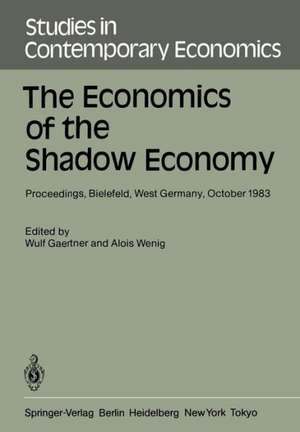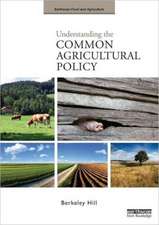The Economics of the Shadow Economy: Proceedings of the International Conference on the Economics of the Shadow Economy, Held at the University of Bielefeld, West Germany, October 10–14, 1983: Studies in Contemporary Economics, cartea 15
Editat de W. Gaertner, A. Wenigen Limba Engleză Paperback – 1985
Din seria Studies in Contemporary Economics
-
 Preț: 309.48 lei
Preț: 309.48 lei -
 Preț: 502.75 lei
Preț: 502.75 lei -
 Preț: 424.81 lei
Preț: 424.81 lei -
 Preț: 490.25 lei
Preț: 490.25 lei - 15%
 Preț: 637.78 lei
Preț: 637.78 lei -
 Preț: 421.72 lei
Preț: 421.72 lei -
 Preț: 501.41 lei
Preț: 501.41 lei -
 Preț: 485.46 lei
Preț: 485.46 lei - 15%
 Preț: 466.13 lei
Preț: 466.13 lei - 15%
 Preț: 647.08 lei
Preț: 647.08 lei - 15%
 Preț: 638.89 lei
Preț: 638.89 lei - 15%
 Preț: 638.89 lei
Preț: 638.89 lei -
 Preț: 490.25 lei
Preț: 490.25 lei -
 Preț: 488.12 lei
Preț: 488.12 lei -
 Preț: 485.24 lei
Preț: 485.24 lei - 15%
 Preț: 441.51 lei
Preț: 441.51 lei -
 Preț: 493.51 lei
Preț: 493.51 lei -
 Preț: 420.20 lei
Preț: 420.20 lei -
 Preț: 383.71 lei
Preț: 383.71 lei - 15%
 Preț: 635.80 lei
Preț: 635.80 lei - 15%
 Preț: 648.42 lei
Preț: 648.42 lei - 15%
 Preț: 644.82 lei
Preț: 644.82 lei -
 Preț: 487.37 lei
Preț: 487.37 lei -
 Preț: 451.26 lei
Preț: 451.26 lei - 15%
 Preț: 635.15 lei
Preț: 635.15 lei - 20%
 Preț: 557.75 lei
Preț: 557.75 lei - 15%
 Preț: 650.04 lei
Preț: 650.04 lei -
 Preț: 493.34 lei
Preț: 493.34 lei - 15%
 Preț: 634.18 lei
Preț: 634.18 lei -
 Preț: 486.60 lei
Preț: 486.60 lei -
 Preț: 495.46 lei
Preț: 495.46 lei -
 Preț: 485.46 lei
Preț: 485.46 lei -
 Preț: 481.58 lei
Preț: 481.58 lei -
 Preț: 485.61 lei
Preț: 485.61 lei -
 Preț: 418.67 lei
Preț: 418.67 lei -
 Preț: 417.90 lei
Preț: 417.90 lei -
 Preț: 492.74 lei
Preț: 492.74 lei -
 Preț: 488.33 lei
Preț: 488.33 lei -
 Preț: 419.21 lei
Preț: 419.21 lei -
 Preț: 483.12 lei
Preț: 483.12 lei -
 Preț: 486.60 lei
Preț: 486.60 lei -
 Preț: 425.42 lei
Preț: 425.42 lei - 15%
 Preț: 638.57 lei
Preț: 638.57 lei - 15%
 Preț: 637.28 lei
Preț: 637.28 lei -
 Preț: 483.70 lei
Preț: 483.70 lei -
 Preț: 414.21 lei
Preț: 414.21 lei -
 Preț: 428.84 lei
Preț: 428.84 lei - 15%
 Preț: 633.19 lei
Preț: 633.19 lei -
 Preț: 478.71 lei
Preț: 478.71 lei - 15%
 Preț: 639.41 lei
Preț: 639.41 lei
Preț: 398.74 lei
Nou
Puncte Express: 598
Preț estimativ în valută:
76.30€ • 79.86$ • 63.50£
76.30€ • 79.86$ • 63.50£
Carte tipărită la comandă
Livrare economică 31 martie-14 aprilie
Preluare comenzi: 021 569.72.76
Specificații
ISBN-13: 9783540150954
ISBN-10: 3540150951
Pagini: 420
Ilustrații: XIV, 402 p.
Dimensiuni: 170 x 244 x 22 mm
Greutate: 0.67 kg
Ediția:Softcover reprint of the original 1st ed. 1985
Editura: Springer Berlin, Heidelberg
Colecția Springer
Seria Studies in Contemporary Economics
Locul publicării:Berlin, Heidelberg, Germany
ISBN-10: 3540150951
Pagini: 420
Ilustrații: XIV, 402 p.
Dimensiuni: 170 x 244 x 22 mm
Greutate: 0.67 kg
Ediția:Softcover reprint of the original 1st ed. 1985
Editura: Springer Berlin, Heidelberg
Colecția Springer
Seria Studies in Contemporary Economics
Locul publicării:Berlin, Heidelberg, Germany
Public țintă
ResearchCuprins
1: Conceptual Questions.- “The Subterranean Economy, Redux”.- “The Meaning of the ‘Underground Economy’ and the Full Compliance Deficit”.- “Subterranean Labor Markets: A Conceptual Analysis”.- “Crime: What Should be Recorded in the National Accounts, and What Difference Would it Make?”.- 2: Empirical Evidence.- “The Parallel Economy in Austria”.- “Measuring the Shadow Economy: The Case of Switzerland”.- “The Unobserved Economy and the National Accounts in the Netherlands” A Sensitivity Analysis.- “The Relationship Between the Formal and Hidden Economies: An Exploratory Analysis for Four Countries”.- “Belgium’s Irregular Economy”.- “Market Motives in the Informal Economy”.- 3: Theoretical Approaches.- “Macroeconomic Policy and the Shadow Economy”.- “Macroeconomic Policy in the Presence of an Irregular Sector”.- “A Microeconomic Analysis of Black Labour Demand and Supply”.- “The Behavior of Tax Evaders”.- “Optimal Tax Evasion & Optimal Tax Evasion Policy: Behavioral Aspects”.- “The Shadow Economy and Morals: A Note”.- 4: Policy Implications.- “Public Policy and Tax Evasion: Some Problems”.- “Tax Evasion and Government Policy”.- “Is a Growing Unobserved Sector Undermining Monetary Policy in the Federal Republic of Germany?”.- 5: Household Production.- “The Disappearance of Domestic Servants and the Underground Economy”.- “Household Composition, Social Networks and Household Production”.- 6: Eastern Countries.- “Peculiarities and Limits of the Second Economy in Socialism (The Hungarian Case)”.- “The Second Economy in the Soviet Union and its Implications for Economic Policy”.- “Repressed Inflation and Second Economy Under Central Planning” with an appendix “MaximumPrinciple for Speculative Money Balances” by Andrzej ZIEBA.- Author Index.










